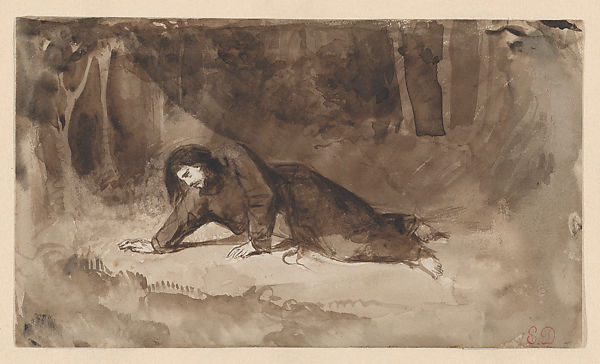Apr 03., 2020 / Features, General, Soul Food
A Lesson in Patient Suffering: Palm Sunday and Covid-19
A reflection on the readings of Palm Sunday 2020 by Sr. Cecille Tuble, rc.
Palm Sunday of the Lord’s Passion came early for all of us. Too early, and now too long. We live it now in the midst of this pandemic. The whole world is brought on its knees: this plague has struck and affected everyone and cut across all boundaries of culture, race, religion, age, gender, socio-economic and political status. According to the latest statistics, Covid-19 has affected 204 out of 235 countries and territories. Truly, it is a global horror that is made more frightening in the fact that it is still happening, right now.
How do we make sense of this ongoing tragedy? How do we keep faith in these appalling times?
The readings of Palm Sunday offer us rich insights and deep consolation, as they unfold before us the story of our Lord’s passion. They call us, as the Opening Prayer or Collect tells us, to follow Christ’s example of humility, and to “heed his lesson of patient suffering,” for therein shall we share in his Resurrection too. The first and second readings give us an overview of who Jesus is, the One who did not shield his face from buffets and spitting, but looked upon God as his help. “He emptied himself…. becoming obedient to the point of death, even death on a cross.” This is not the end of his story, of course: God “greatly exalted him,” so that every tongue will henceforth proclaim him Lord. The Gospel from Matthew recounts several stories in the Passion narrative: the betrayal of Judas, the Last Supper, Gethsemane, the trials before the Sanhedrin and Pilate, the betrayal of Peter, his torture, crucifixion, death and burial. It is a familiar story that, year in and year out, still makes our hearts tremble, for it is the story of our redemption by a God who became one of us, and gave his life in order to save us. He died so that we may live.
And yet this year it takes on an even more luminous significance. Death is around us. We see its long shadow in the familiar contours of our homes which have become our confinement. We feel its cold fingers grasp our hearts as every day we hear the statistics rising, as we read of more deaths and infected, of lack of resources to cope with this horrendous suffering, of our doctors and nurses and medical workers falling ill themselves and dying, of the homeless and the poor whose dire circumstances are further exacerbated by this crisis.

Yes, death is in our midst, but so is the Lord. Perhaps the deepest invitation for us is to suffer all of this with the Lord, and in the Lord. By doing so, we live out this lesson in patient suffering. However, patient suffering is not despairing passivity, or abject resignation. We are called to be brave, generous, responsible and compassionate. We are called to be resilient in our loving. We are called not to run away from this harsh reality, but to live it in faith. Our confined spaces at home is our Gethsemane, where we are invited to enter into the profound anguish but trusting surrender of Jesus, and to pray: “My Father, if it is possible that this cup of suffering pass SOON, but your will be done.” When we unite ourselves with the courageous labors of our medical workers and front-liners, when we do all that we can to support and help them and the most vulnerable of our people, we walk with Jesus on his lonely, arduous road to Calvary. When we pray for all those who have died, when we face our own specter of death with faith and humility in the fidelity of a loving Father, we follow Jesus in his obedience, all the way to his self-emptying on the cross. When we resist all temptations to despair, when we practice prudence and discernment in spreading news and videos, when we give love, hope and encouragement instead of fear and panic, when we do our own small share in containing this virus, we touch the fabric of his garments, until they are stripped on the hill.
But perhaps the greatest act of patient suffering for us is to see all this in faith, and therefore in gratitude. To see God actively working, tirelessly laboring with us and for us to bring an end to this pandemic is a daily act of gratitude. For it is easy to get drowned by the bad news. We must beg for the grace to truly see, to be healed of our jaded, faithless blindness, that there is much to be grateful for. It is in gratitude that we begin to see glimpses of Easter hope: doctors, nurses and medical staff who transcend their own fears and personal interests to give their lives to their patients. Government officials who are dedicated, hardworking and creative, truly beacons of leadership in this darkness. Business corporations and owners, private organizations who do their share to help. Ordinary citizens who volunteer, risking health and lives, to ease the suffering of others. The unpretentious but heroic efforts of ordinary people to contribute and do their share in fighting this pandemic. All this is God’s grace, working in mysterious, hidden but all-powerful ways. Some acts may well be spectacular, attention-getting. But most will be invisible, except to those who look for them, who desire to be grateful, who desire to thank God for his untiring loving, especially in this darkness. God has never left us to suffer alone.
In God’s vast providential love, there is no small grace. True, death is around us, but death will not have the last word. And just as in Jesus, we know that our story, this story of Covid-19, will end with Easter, and we will be resurrected in God’s love.









